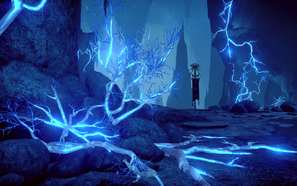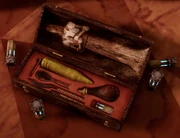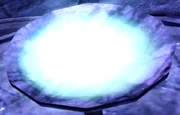
Lyrium is a valuable but dangerous mineral-like substance.
According to Bianca Davri the mineral is extremely volatile and sometimes explodes for no reason. Physical contact with raw lyrium ore will cause serious injury and psychological damage for humans, elves, and Qunari, and will kill mages outright.
The Mining caste of the dwarves is the only group capable of safely mining and processing lyrium into a less dangerous and more useful form. How they achieve this is a tightly guarded secret.[1] Generations of proximity to lyrium ore veins have made dwarves naturally resistant, though not completely immune, to its effects. Even their resistance is only skin deep, as open cuts and direct exposure to the eyes leaves them vulnerable. Surface dwarves lose this resistance over time.
Nature
Lyrium exists both in the mortal world and in the Fade[2] and somehow bridges the gap between them.[3] It grows even in the Raw Fade unclaimed by spirits where it is always night.[4] Lyrium consumption strengthens a mage's relation to the Fade, thereby boosting mana.[5] The Chantry believes lyrium to be the emerald waters of the Fade, the very substance of creation itself, from whence the Maker fashioned the world.[3][6] Dagna's research indicates that lyrium and the Fade "are linked".[7]
"Isana" is the dwarven word for lyrium. They are taught that it is a gift from the Stone.[8]
Some scholars believe that lyrium is alive.[9]
The song
Raw lyrium emits a strangely soothing sound that some call the voice of the Maker.[3]
Dwarven miners are able to find lyrium veins by ear[11][12] as they claim that they hear the Stone sing.[13]
Cole says that the song of red lyrium is different from the song of regular lyrium.[14] Whether it is also different from the call of the Old Gods is unclear. In his party banters Cole remarks that once "everything sang the same"[15] and then "the song was sundered"[16], even though "the old song still echoes" inside dwarves, almost like templars.[16].
The lyrium-infused staff found in Heidrun Thaig gives a faint hum: a wistful tune reminiscent of a faraway or forgotten place.[17]
The book that belonged to Paragon Garal mentions that dwarves once knew the song was the "Titan's hymn".[8] The titan communicates with Valta through its lonely song, revealing to her the forgotten dwarven history.[18]
Mining
Dwarves from the mining caste traditionally mine raw lyrium and process it as they are the only ones who know how to safely mine the mineral.
Uses
Enchantment
Processed lyrium is used by dwarves and the Tranquil to enchant items.
Trace amounts of lyrium can be infused in stones to create glowstones, which are used to light passages. This practice is most common in Orlais.[3][21]
The Anvil of the Void allowed Caridin to turn living dwarves into golems of steel and stone with the use of lyrium. The process involved dressing the volunteer in armor the size of the golem, then pouring molten lyrium through the eye holes, mouth hole, and joints of the armor. A magical, not mechanical, process animated the golems.[22][23][24]
The smiths of Amgarrak, with the aid of a Tevinter mage, created strange contraptions known as lyrium wells, capable of shifting objects and people through different levels of the Fade and creating runic golems. However, this was used against them when one of their experiments created a monstrosity capable of manipulating the Wells. After realizing what their creation was capable of, the smiths were forced to seal the thaig to make sure that it wouldn't be able to escape.

Fenris uses his lyrium tattoos
With the proper expertize, one can infuse lyrium within one's skin which looks like markings. The agonising process makes the victims more biddable, with the potential side effect of lost memories.[25] Touching the markings may be physically painful.[25] In Fenris' case these "lyrium tattoos" greatly enhance his combat skills, making him hard to track, giving him magic resistance, and generating bursts of damaging spirit energy. They even grant him the ability to phase through solid objects, an act that taps into the Fade.
Runes
Dwarven Shapers craft lyrium runes that contain the actual thoughts of the ones who made them. These runes comprise the Memories, the archives of Orzammar.[26]
Ingestion
When mixed into liquid and ingested, lyrium allows mages to enter the Fade when fully aware, unlike all others who reach it only when dreaming. This unique property is essential for the Circle of Magi's Harrowing ritual.
Such potions can also be used to aid in the casting of especially taxing spells, for a short time granting a mage far greater power than the mage normally wields.[11]

A templar's lyrium kit
While mages use lyrium in their arcane spells and rituals, templars ingest the primordial mineral to enhance their abilities to resist and dispel magic.[27] It is also said that the substance gives them boldness and empowerment.[28]
Rituals
Mages can also be branded with lyrium to become Tranquils, forever severing their connection to the Fade.[29]
Engineering
Lyrium Sand is used to create Dworkin Glavonak's explosives: grenades that are said to match those used by the Qunari.
Dwarves use lyrium blast charges to open up passages, or seal them. Dwarves used them at one point to open up some of the old tunnels under Minrathous.[30] They are also used by the Legion of the Dead to collapse a tunnel during The Descent.
Exposure and adverse effects

Lyrium in liquid form
Even though dwarves have a natural resistance, raw lyrium is dangerous for all but the most experienced of the mining caste to handle. Even for dwarves, exposure to the unprocessed mineral can cause deafness or memory loss. For humans and elves, direct contact with lyrium ore produces nausea, blistering of the skin, and dementia.
In its processed form, lyrium may be handled by anyone, but long term exposure or a single mistake while working with it can lead to serious side effects.
Addiction
Ingesting Lyrium is addictive. Since Templars are given lyrium to "develop their talents", this serves as incentive to keep them loyal to the Chantry, which controls the lyrium trade.
However Alistair seems to doubt whether it actually has any real effect and Cassandra is apparently capable of using talents similar to the Templar though the Seekers of Truth powers originate from a different source.
- Evangeline
- Rhys
- Evangeline
- — Chapter 14, Asunder
And there's nothing to be done about it. The Chantry controls the supply of lyrium, and thus they control the templars. There is no turning back from the order once you're within.
Long-term use
Prolonged use by Templars becomes addictive, the cravings unbearable. Over time, they grow disoriented, incapable of distinguishing memory from present, or dream from waking. They frequently become paranoid as their worst memories and nightmares haunt their waking hours. Other known side effects than paranoia include obsession, and dementia.[27]
Cullen Rutherford states that templars also lose their memories due to prolonged imbibing of lyrium. It starts small at first − a misplaced item or words to a song − but more fades away over time.
Withdrawal
Symptoms of lyrium hunger pangs include weakness, headaches, forgetfulness, an unquenchable thirst, and cold hands.[31]
“They don't do anything to keep you. You join the order, you're free to walk away. But they're the only one who've got the dust. Lyrium. [...] You need to drink the stuff to face down the magickers. Problem is, if you ever try to stop... (he sighs) it just about kills you.” ―Samson[32]
Mages
Mages are the most affected by exposure to lyrium, as even close proximity to the substance is invariably fatal to them. Additionally, they have been known to suffer physical mutation from long-term use.[11]
According to Vivienne, anything that increases the capacity of a mage's magic (such as lyrium) creates a damaging effect on the body. For mages, this is known as mana imbalance. Some adverse effects of mana imbalance may include conscious dreaming in the Fade (such as those experienced during the Harrowing), periods of dizziness, and hearing voices. Unlike templars, mages are able to recuperate from the adverse effects.
Justice's unique ability to equip the lyrium ring implies that spirits are resistant to lyrium's toxic effects.
Red lyrium
- Main article: Red lyrium
Red lyrium is a rare, more potent and more addictive form of raw lyrium created when normal lyrium is corrupted by the taint.
Notes
- Deep mushrooms often grow near lyrium veins.[33]
- Beneath the Frostback Mountains there are rich deposits of lyrium veins which have been mined by the dwarves of Orzammar for many millennia.
- Healing magics known to the Dalish can be used to alleviate the effects of lyrium withdrawal.[34]
Trivia
- Effects of lyrium addiction were intended to be implemented in Dragon Age: Origins for mage and templar companions and the use of lyrium potions would have diminishing returns. However, this was ultimately dropped because most characters would need to drink lyrium potions to remain effective, guaranteeing addiction, and the developers couldn't find a way to implement addictions in a way that was neither meaningless nor excessively punishing.[35]
- In Dragon Age: Inquisition, Cullen goes through lyrium withdrawal.
- The ashes of the prophet Andraste have the miraculous powers of healing, but Oghren believes the lyrium veins in the temple's wall are richer and purer than anything he has sensed in a while, and that it is changing the building and everything in it.[36] However, according to Chantry legends, Havard experienced the healing effects of the ashes before they were taken to the temple.[37]
- Red lyrium is described as being an anti-magic substance, an opposite force to regular lyrium.[38]
- The glowing slime is an animal living underground which leeches lyrium from the walls allowing it to develop a substance which disorients its prey as well as giving this animal a distinctive blue-green color.
Gallery
See also
![]() Codex entry: Lyrium
Codex entry: Lyrium
![]() Codex entry: Lyrium
Codex entry: Lyrium
![]() Codex entry: Red Lyrium
Codex entry: Red Lyrium
![]() Codex entry: Confessions of a Lyrium Addict
Codex entry: Confessions of a Lyrium Addict
![]() Codex entry: At What Cost
Codex entry: At What Cost
![]() Codex entry: Lyrium Blast Charges
Codex entry: Lyrium Blast Charges
References
| ||||||||||||||||||||
| ||||||||||||||||||||||||







